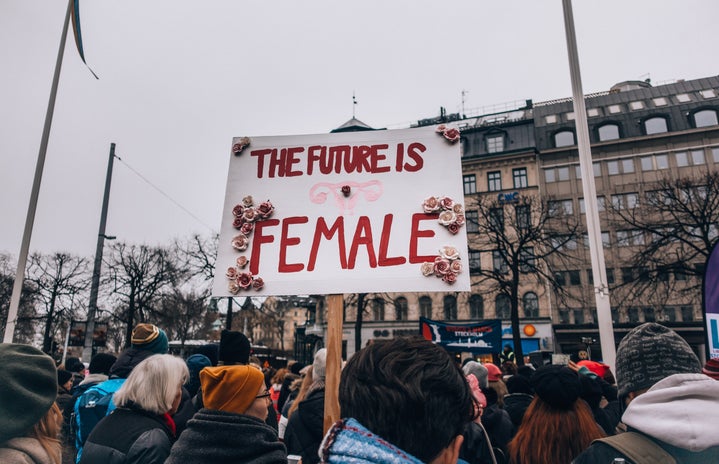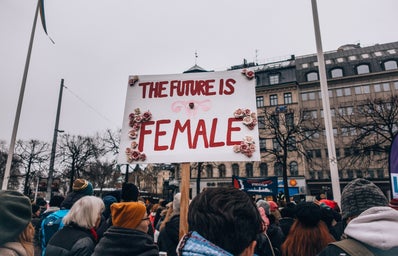It seems as though every time we manage to take a step in the right direction with women’s reproductive rights, there is an impending step backwards in the form of a neat package of misogyny waiting just around the corner. This time, it was presented as the new anti-abortion legislation in Poland, a country that already has some of the strictest abortion laws in Europe. As a woman, and a daughter of Polish immigrants, this ruling saddened me to my core.
On October 22, 2020, Poland’s Constitutional Tribunal ruled that abortions due to fetal defects are unlawful, effectively banning the majority of all abortions in Poland. This means that the only legal circumstances abortions can take place under are now reduced to cases of rape or incest, or when the woman’s life or health is at stake. The new ruling means that even if the fetus is irreparably impaired, the woman must carry it for the full term, as an abortion would now be illegal. This decision took place without so much as a prior warning, not to mention a democratic vote, as the country teeters on populism and is heavily reliant on a set of long-outdated Catholic values. The bottom line is – Polish women will now be forced to give birth to fetuses with congenital defects.
The reaction to the court’s ruling declared by the constitutional panel (composed primarily of men), was astronomical and unignorable. Many were in shock and dismay at the fact that the party in power (PiS) would hurry such life-altering decisions during the pandemic, at a time when people are already fearing for their lives. It has since been questioned whether timing was a motivator. Nevertheless, the widespread anger resulted in now over two-week-long protests (mainly in the country’s capital city of Warsaw, but also in Krakow, Lodz, and Szczecin), that have seen thousands of people in face masks, carrying signs, and having painted red lightning bolts, the symbol of the women’s strike, on their faces.
Women are undoubtedly fed up with being forced to live under an intolerant, forcibly Catholic regime, while having basic human rights decided by a group of individuals whose ruling does not affect them. Explaining the decision, head of the Constitutional Tribunal, Julia Przyłębska, stated the opposed abortion law, “legalises eugenic practices in the field of the right to life of an unborn child and makes the right to life of an unborn child dependent on his or her health … is inconsistent … with the constitution”. It is known that many doctors in Poland reserve the legal right to refuse to perform abortions when it opposes their religious beliefs, and women are often declined the procedure even under legal circumstances. Furthermore, there were “less than 1000 legal abortions performed in Poland in 2019, yet it is estimated 80,000 to 120,000 are done abroad”.
Watching the outpour of support from women all over the world has been touching to say the least; the best examples can be seen in comments under social media posts documenting the rallies. Using the hashtag #strajkkobiet meaning “women’s strike”, and #pieklokobiet meaning “women’s hell”, social media sites like Instagram and TikTok have been instrumental in spreading the message. Reading comments of women supporting women who they do not even know, yet stand with, is remarkably heartwarming. This actively proves that even at times like this, there is good in the world, and showcases the immense power in women coming together in the face of the patriarchy.
Activists such as Karolina Wieckewicz, a female rights activist with the group Abortion Dream Team (Aborcyjny Dream Team), have been targeted by anti-choice organizations and accused of being murderers. Pro-choice advocators like Karolina are waging a strong, ongoing fight for access to safe and legal abortions for women whose lives are now, once again, at high risk. People need to be reminded that prohibiting abortion results in illegal and dangerous procedures that women resort to in times of need. Instead of decreasing abortion rates (as safe and just reproductive laws have been proven to do), the women that can afford to are forced to go abroad to countries where they may have uncertainties surrounding the procedure and risk their lives at the hands of an inept and sexist government.
There are many questions that the anti-choice groups are unable to answer. What happens to the fetus forced to be born with abnormalities when it has inadequate care or resources further down the line? How do you provide financial, physical, and psychological care for a woman unprepared and unwilling to go through labor, yet nonetheless forced to do so? How will you help when children are placed into orphanages or moved around in foster care and often maltreated in the process of this instability? It is the vague responses to questions like these that query whether the term “pro-life” is really an accurate statement. Photos of women dressed in costumes from The Handmaid’s Tale are not an unsound representation of the direction in which Polish society is moving.
To those that claim the response to the ruling was exaggerated or unnecessary, I say – put yourselves in the shoes of the women at risk. Imagine getting the life-altering news that your planned fetus is damaged during the gestation period and being forced to carry it to term and go through labor anyway. Imagine not being able to make the appropriate choice of when you do or do not want to become a parent, and it being thrust upon you without having a say in the matter. Imagine the mental stress and consequent trauma that this will impose upon so many women who are already under mental and physical stress due to pregnancy.
Deciding to get an abortion is already by no means an easy circumstance to go through, and the procedure should be considered as basic healthcare in direct relation to reproductive health. This goes exceedingly further than opposing the anti-abortion ban, it is a fight against the longstanding patriarchal culture that has been ingrained in Polish society for far too long. To all my Polish sisters – I stand with you and will continue to advocate all the way from Canada, and I encourage others to do the same.
If you’re not sure how you can help, here is a list of organizations fighting against the anti-abortion ruling and for women’s rights in Poland, that need support and help spreading the word:
Aborcja Bez Granic (Abortion Without Borders)



